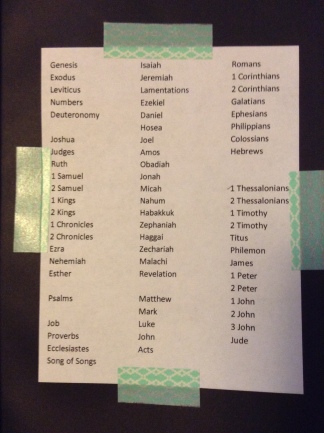For you have not come to what may be touched, a blazing fire and darkness and gloom and a tempest and the sound of a trumpet and a voice whose words made the hearers beg that no further messages be spoken to them. For they could not endure the order that was given, “If even a beast touches the mountain, it shall be stoned.” Indeed, so terrifying was the sight that Moses said, “I tremble with fear.” But you have come to Mount Zion and to the city of the living God, the heavenly Jerusalem, and to innumerable angels in festal gathering, and to the assembly of the firstborn who are enrolled in heaven, and to God, the judge of all, and to the spirits of the righteous made perfect, and to Jesus, the mediator of a new covenant, and to the sprinkled blood that speaks a better word than the blood of Abel.
See that you do not refuse him who is speaking. For if they did not escape when they refused him who warned them on earth, much less will we escape if we reject him who warns from heaven. At that time his voice shook the earth, but now he has promised, “Yet once more I will shake not only the earth but also the heavens.” This phrase, “Yet once more,” indicates the removal of things that are shaken—that is, things that have been made—in order that the things that cannot be shaken may remain. Therefore let us be grateful for receiving a kingdom that cannot be shaken, and thus let us offer to God acceptable worship, with reverence and awe, for our God is a consuming fire. Hebrews 12:18-29
In the 1950‘s, a man named C. S. Lewis wrote a collection of books called The Chronicles of Narnia. Lewis was a Christian theologian, regarded by many as one of the best theologians of his time, and many people see in the Narnia books an allegory of Christianity, with Aslan the lion as the Christ figure. In The Chronicles of Narnia, Lewis wrote a conversation between four children and Mr. Beaver. The children ask Mr. Beaver if Aslan the lion is safe, and in reply he says, “’Safe?’ Who said anything about safe? ‘Course he isn’t safe, but he’s good. He’s the King, I tell you.”
How safe could Aslan have been? He was a lion, after all, and lions are by nature not safe animals. Lions are one of the biggest predators where they live, killing other animals and sometimes people in order to eat. Even lions that have been cared for and trained by humans over the course of many years are not necessarily safe or tame and sometimes attack their trainers.
The Israelites clearly understood that God – the Lion of Judah – is not safe. After rescuing the Hebrew people from slavery in Egypt, bringing them out after plagues and through the Red Sea, God met with the people at Mount Sinai. Moses was the one that God had spoken through to Pharaoh, but God intended to meet with all the people at the mountain, not just Moses. However, when the people saw the affects of God’s presence on the mountain, they realized that He was a God to be feared. Exodus 19:16-19 describes it this way:
On the morning of the third day there were thunders and lightnings and a thick cloud on the mountain and a very loud trumpet blast, so that all the people in the camp trembled. Then Moses brought the people out of the camp to meet God, and they took their stand at the foot of the mountain. Now Mount Sinai was wrapped in smoke because the LORD had descended on it in fire. The smoke of it went up like the smoke of a kiln, and the whole mountain trembled greatly. And as the sound of the trumpet grew louder and louder, Moses spoke, and God answered him in thunder.
The people were so frightened by what they saw on the mountain that they begged not to have God address them directly but through Moses as a mediator. The physical signs on the mountain of God’s presence convinced the people that God was altogether holy and unapproachable.
The writer of the book of Hebrews says that even Moses was frightened by God’s presence on the mountain. Moses, who had spoken with God through a burning bush; Moses, who had experienced all the plagues on Egypt; Moses, who had led the people through the middle of the Red Sea; Moses, who had a privileged relationship with God that not even Aaron, the first high priest, could claim – Moses was terrified by what he saw on the mountain. Everything that he had done for God did not allow him to feel safe in the presence of the living God.
On the mountain, God gave His law to the people. The law came with the expectation of condemnation, judgment, and death. Many sins, such as adultery or murder, called for death for the person committing the sin. Others were punished through being expelled from the people, having to make their way through the world alone. The law was meant to show the people the extreme sinfulness of sin against a perfect, holy, glorious God. The apostle Paul wrote of this in Romans, saying, “Sin, seizing an opportunity through the commandment, deceived me and through it killed me . . . It was sin, producing death in me through what is good, in order that sin might be shown to be sin, and through the commandment might become sinful beyond measure.” The law served as God’s mirror to a sinful people, showing them their guilt in very real, very tangible, and very bloody ways. It would be impossible to claim that sin is not a problem when, in order to reconcile yourself to God after committing some sin, you had to procure and then sacrificially slaughter a bull or goat. The purpose of the law was to drive the people to their knees, able to cry, “What a wretched man I am!”
However, the writer of Hebrews wrote that Christians have not come to Mount Sinai and the law, to death and the condemnation of an unapproachable God. We have come to Mount Zion, the heavenly Jerusalem, and its inhabitants. Just as the temple and Jerusalem were made to be God’s dwelling place in the midst of His people, the heavenly Jerusalem is God’s dwelling place where He gathers His people to Himself. While Sinai was terrifying, Zion is inviting. Sinai caused the people to tremble and beg God not to speak to them, Zion invites us to come close and boldly stand before God. Zion is full of joyous, worshipping angels and those who have died in faith, but in a larger sense we are all in Zion. In saying that we have come to “the assembly of the firstborn who are enrolled in heaven,” Hebrews says that we who are still living in faith on earth are already come to Zion.
The difference between Sinai and Zion is not us. We are the same as the Israelites. We still sin and still fall far short of the glory of God. The law still condemns us and proves us to be unrighteous sinners, unable to attain salvation on our own.
The difference is not God, either. God is still perfect, glorious, and holy. God is still righteous, unable to have anything to do with sin. The difference is that God has given sinners a way to come before Him through the person and work of His Son, Jesus.
Jesus came here as a man who was both human and God. In His years on earth He lived the perfect life that we cannot live, died the death that we should die, and then was resurrected in glorious triumph over sin, death, and hell. His life, death and resurrection gives access to God to those who believe. His blood speaks better than the blood of Abel because Abel’s blood, calling up from the ground to God, spoke of Cain’s guilt and resulted in His condemnation and punishment, while the blood of Jesus Christ says that those who believe in Him as Lord and Savior are forgiven, clean, made righteous by His once-for-all sacrifice. Through Jesus, the unapproachable God of Sinai becomes approachable, the refuge for His people. This is why the writer of Hebrews, in 7:22, refers to Jesus as the guarantor of a better covenant. The law and the old covenant brought death, Jesus and the new covenant brings life.
The picture being painted for us in these verses is one of joyous celebration in the city of God, where His presence dwells. Those who dwell in the city with Him and with the angels are happy in His presence, worshipping and rejoicing forever. It is both a picture that we share now and one that we will fully be part of someday in the future. Now, we come together to worship God here, as the body of Christ on earth, in celebration of who He is and what He has done. Someday, we will join with the angels and with those who are already departed to be with Jesus in heaven. There, our joy will be made complete as we see Jesus, the author and perfector of our faith, face to face. God Himself is the reward for a life made perfect by the blood of our sacrificial Lamb.
However, having received a better promise and a better covenant does not mean that we have received a different, better God. Mark Twain once said that God was atrocious in the Old Testament and attractive in the new, a biblical Jekyll and Hyde story. Many people, including some Christians, seem to agree with this assessment of the way God appears in the Bible. The Old Testament God is harsh, mean, and cruel, but the New Testament Jesus is soft, nice, and safe. The Old Testament God was scary, but the New Testament Jesus is someone in whom we have nothing to fear. Passages like this one in Hebrews are seen as making a contrast, not just between the law and the new covenant, but between the two gods of the Bible: the mean one and the nice one.
The Bible does not allow for this fallacy. In both testaments of the Bible, God is shown as the judge over the earth. All people are accountable to Him for their actions, thoughts, and words throughout their whole life. This is true whether or not people want to believe it, whether or not people want to allow it, whether or not people even believe in God at all. Regardless of someone’s recognition or refusal of the truth, God is the judge and will hold all people accountable. One day, God will come to judge everyone on earth and the only thing that will allow anyone to be spared from the fires of hell is knowing Jesus, believing on Jesus, clinging to Jesus as our all-in-all, the only One who has the power to save.
Maybe that makes us feel like Jesus is safe and nice, saving us from a scary God. That is not the case. Jesus was gentle and kind when He needed to be, but harsh and full of righteous anger when necessary. It was not a nice Jesus who took a whip into the temple and drove out the moneychangers. It was not a nice Jesus who rebuked the Pharisees again and again, calling them hypocrites, blind guides, and whitewashed tombs. It was not a nice Jesus who taught such hard things that a huge number of those who had been following Him gave up and turned back, and it is not a nice Jesus that we worship now.
While all of us probably have pictures in our heads of Jesus, most of those pictures have been put there by religious art. A picture of Jesus laughing with children, sharing the last supper with His disciples, or solemnly praying in Gethsemane, or hanging from the cross, or even walking from the tomb with a halo of light surrounding Him as the women who followed Him or His disciples kneel to worship. Here is the picture that John paints for us in the book of Revelation of the risen Jesus.
Then I turned to see the voice that was speaking to me, and on turning I saw seven golden lamp stands, and in the midst of the lamp stands was one like a son of man, clothed with a long robe and with a golden sash around his chest. The hairs of his head were white, like white wool, like snow. His eyes were like a flame of fire, his feet were like burnished bronze, refined in a furnace, and his voice was like the roar of many waters. In his right hand he held seven stars, from his mouth came a sharp two-edged sword, and his face was like the sun shining in full strength. When I saw him, I fell at his feet as though dead.
As though that picture were not enough for us to grasp the majesty, holiness, power, strength, and glory in which Jesus now lives and in which He will return, John gives us another description of Jesus later in Revelation.
Then I saw heaven opened, and behold, a white horse! The one sitting on it is called Faithful and True, and in righteousness he judges and makes war. His eyes are like flames of fire, and on his head are many diadems, and he has a name written that no one knows but himself. He is clothes in a robe dipped in blood, and the name by which he is called is The Word of God. And the armies of heaven, arrayed in fine linen, white and pure, were following him on white horses. From his mouth comes a sharp sword with which to strike down the nations, and he will rule them with a rod of iron. He will tread the winepress of the fury of the wrath of God the Almighty. On his robe and on his thigh he has a name written, King of Kings and Lord of Lords.
This is not a nice, safe Jesus. This is not someone that you would invite to sit on your couch and watch a movie. This is someone that, were you to come face to face with Him, would cause you to fall to your knees in reverence and worship. While we are able to feel secure in our salvation – for the God who has promised that all who call on Him and come to Him through His Son, Jesus, will be saved from His wrath against sin is true and therefore does not lie – we should not become complacent in that salvation, believing that this new and improved nice God will be happy with us getting comfortable and settled in our faith.
As verse 25 of our passage in Hebrews says, if God severely punished the Israelites in the desert for ignoring and rejecting His commands, how much more will He punish those who, having heard the promise of the gospel and having caught a glimpse of Zion, turn away and reject God Himself? It is important to remember that this letter was written to a church, a body of believers. The warning here applies to us. We have the example of the Israelites wandering in the desert for 40 years, being killed by earthquake and plague and snakes and all manner of things, for their disobedience and disbelief even though they heard the very voice of God on the mountain, telling them what they should do. We have the voice of God from heaven, through the Bible, telling us to repent and believe and to keep on repenting and believing, holding fast to the promise we’ve received.
It is a worse sin to reject the person of God’s Son, Jesus Christ, than to reject God‘s law. Although the idea that not all sin is equal is not popular today, and although all sin is evil in God’s eyes and all sin will condemn the unrepentant on the day of judgment, the Bible is clear that some sins carry more consequences than others. While all who do not have Jesus as their Savior in this life will die in their sins, apart from God, and spend their eternity in hell, not all eternal punishment is the same. Just as punishment under the law was not the same for all offenders, some being punished monetarily and other through execution, not all of those who die in their sins will suffer the exact same fate. Jesus spoke of this fact in Matthew 11:20-24, saying,
Then he began to denounce cities where most of his mighty works had been done, because they did not repent. “Woe to you, Chorazin! Woe to you, Bethsaida! For if the mighty works done in you had been done in Tyre and Sidon, they would have repented long ago in sackcloth and ashes. But I tell you, it will be more bearable on the day of judgment for Tyre and Sidon that for you. And you, Capurnaum, will you be exalted to heaven? You will be brought down to Hades. For if the mighty works done in you had been done in Sodom, it would have remained until this day. But I tell you that it will be more tolerable on the day of judgment for the land of Sodom than for you.
Chorazin, Bethsaida and Capurnaum were all Jewish cities full of people who knew the Scriptures and were awaiting their Messiah. Capurnaum was even Jesus’ hometown. These three cities had seen most of Jesus’ miracles and many of His sermons. Tyre and Sidon were Gentile cities in Philistia, and Sodom was a city synonymous with sin and depravity. Yet, these three Gentile cities, having not received the privilege of the Son of God within their borders, doing miracles and calling people to Himself, will receive a lighter penalty on the day of judgment than the Jewish cities because, having received more revelation, more was expected of the Jewish cities.
In the book of John, Jesus spoke of this truth again as He was on His way to the cross. Speaking to Pilate, Jesus said, “You would have no authority over me at all unless it had been given you from above. Therefore he who delivered me over to you has the greater sin.” The one who handed Jesus over to Pilate was Caiaphas, the high priest, and by extension all those who had screamed for Jesus’ blood. While Pilate was not innocent in the matter, he was guilty of a lesser sin because he had a lesser understanding of who Jesus was. The Jewish people, the Pharisees, and the priestly council had seen the signs and wonders Jesus worked. They had heard Jesus speak to them about who He was and what He had been sent to do. They also had their Scriptures, our Old Testament, which points to Jesus as Messiah, the ultimate Passover lamb, the One who would come to save His people from their sin. Yet, with all of these privileges, they rejected Him. He longed to gather them to Himself, but they would not.
Just as the Jewish people in the time of Christ, we are a privileged people. Many Christians in this world do not have the right to own their own Bible, or if they could they have not the money to purchase one nor the literacy to read it. As American Christians, we are able to own not just one Bible, but, if we so choose, stacks of Bibles in many different translations. We can use our computers and smart phones to read the Bible over the internet when we don’t have a physical copy of it in our hands. Many Christians in this world do not have the right to attend church and they risk their lives gathering together to sing songs and learn from God’s word and worship Him in community. Here, not only do we openly attend church on Sunday morning, but we have many other times that the church is open. The gathering together as God’s people is taken for granted by many, just the thing that we do Sunday mornings. We must be very careful. It is possible to have all the external signs of Christianity – Bible reading, church attendance, good works, and so on – and yet not have a heart that has been changed by the grace of God in the gospel. God is going to return one day, a day greater than the day He came to the mountain to give the law, and we must be ready, in faith, to meet Him.
Therefore, don’t turn back! Persevere in your faith, knowing that your perseverance will take you home. Don’t lose your first love. Examine yourself, as the apostle Paul wrote, to see if you are in the faith. Don’t take God’s revelation of Himself in the Bible and in the face of Jesus Christ for granted, but be thankful. If you realize today that you are not saved, come to Jesus. Cry to Him in faith and repentance and find rescue for your soul. If you have lost your love for the Lover of your soul, come back to Jesus. Ask for faith to be given to you, and He will be faithful to give you what you need to see you into the kingdom. If you are in despair or doubt, walking through the valley of the shadow of death, cling to Jesus. He is your hope and your peace, the rest that your soul is longing for.
So we return to Lewis, Aslan the lion, and God. Is God safe? No. God is many things. He is awesome and majestic and glorious and wonderful and wrathful and passionate and all-consuming and a great many other things, but neither tame nor safe enter into the description. He is the Lion of Judah, and lions are by nature neither tame nor safe. But is God good? Oh yes. He is very, very good. He’s the King, I tell you.



 ade. He was grieved by this and decided to destroy all life on the earth except for a small family of Noah, his wife, his three sons, and their wives. Noah built a large boat, called an ark, based on instructions he was given by God, and then God shut Noah and his family and some of every kind of animal into the ark and flooded the earth, killing every living thing that wasn’t in the ark. They spent about a year on the ark, then the water dried up and they came out to repopulate the earth. God then made a covenant between himself and the whole world, saying that he would never again destroy the world in a flood. The full story is in Genesis, chapters 6-9.
ade. He was grieved by this and decided to destroy all life on the earth except for a small family of Noah, his wife, his three sons, and their wives. Noah built a large boat, called an ark, based on instructions he was given by God, and then God shut Noah and his family and some of every kind of animal into the ark and flooded the earth, killing every living thing that wasn’t in the ark. They spent about a year on the ark, then the water dried up and they came out to repopulate the earth. God then made a covenant between himself and the whole world, saying that he would never again destroy the world in a flood. The full story is in Genesis, chapters 6-9. and man, initiated by God himself and kept by him.
and man, initiated by God himself and kept by him. We’ll start with a definition – a heresy is a teaching within the church that is so wrong that the church must break away from the person, people, or group promoting that teaching and assume him/them to be unsaved. Heresy is the opposite of orthodoxy. A heretic is someone teaching or holding to a teaching that is heretical.
We’ll start with a definition – a heresy is a teaching within the church that is so wrong that the church must break away from the person, people, or group promoting that teaching and assume him/them to be unsaved. Heresy is the opposite of orthodoxy. A heretic is someone teaching or holding to a teaching that is heretical.




You must be logged in to post a comment.